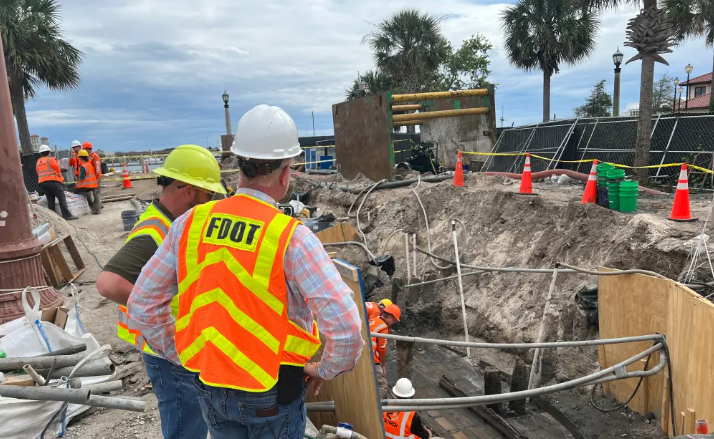This month, Florida highway construction workers uncovered an ancient shipwreck encased in concrete.
Crews dug through eight to ten feet of dirt near the Bridge of Lions in St. Augustine and came up a left leather boot, suggesting that the 20-foot-long relic dates back to the 1800s.
“We believe the vessel may have sank unexpectedly and, over time, was silted in,” Florida Department of Transportation (FDOT) District 2 Secretary Greg Evans said.
“That is why it was preserved so well. It was encapsulated in soil and mud, so there was no air contact for it to decay. It’s truly an incredible find.”
The construction has been put on hold while the Florida Department of Transportation collaborates with SEARCH, an industry leader in archeology that has worked on more than 4,500 projects for government and business in 48 of the United States and 36 other nations.
It will take some investigation and time to learn where the ship came from and what stories it holds.
The excavation and recovery was conducted by Dr. James Delgado of SEARCH, who said in a statement that they believe the ship “was a small single-masted, shallow-draft sailing craft of the 19th century.”
“It was likely used to extract fish and shellfish from coastal waterways and directly offshore,” Delgado said.
“With a dedicated team, including support from the local community and the on-site construction team, we were able to extract the vessel in order to allow the important work on the community’s infrastructure to continue.”
In an interview with Newsweek, Florida Department of Transportation archeologist Ian Pawn described some of the remarkable objects that had survived.
Leather shoes, coins (one from 1869), coconut halves “likely used as cups,” and a fragment of an oil-fired light were all discovered on the ship’s deck, Pawn added.
Before the ship and its contents deteriorate due to the wood drying out from the weather, SEARCH archaeologists must act quickly.
“The boat was disassembled, plank by plank, and removed, with great care to keep each portion wet,” Pawn said, according to Newsweek.
“The pieces will be observed in wet storage to stabilize as we determine future preservation effort. We will be working closely with archeologists and the City of St. Augustine to find a permanent home for this unique find.”
Evans, from FDOT, expressed appreciation for SEARCH’s “careful efforts to preserve this vessel.”
“With every project we undertake, the Florida Department of Transportation is sensitive to the unique needs of the communities we serve, including the potential presence of historical sites and artifacts within construction sites,” Evans said in a statement.
“We look forward to learning more about its significance to the region.”
